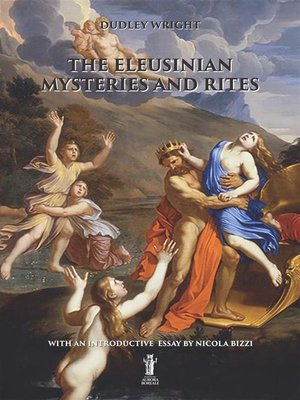
Sign up to save your library
With an OverDrive account, you can save your favorite libraries for at-a-glance information about availability. Find out more about OverDrive accounts.
Find this title in Libby, the library reading app by OverDrive.



Search for a digital library with this title
Title found at these libraries:
| Library Name | Distance |
|---|---|
| Loading... |
This interesting essay by Dudley Wright, The Eleusinian Mysteries and Rites, was first published in London in 1919 by the Theosophical Publishing House.
As a publisher, I decided to give this book a new life, republishing it in the Telestérion series, dedicated to the best texts on ancient mystery cults, with the addition of an introductory essay of mine. And I decided to republish it because, as simple and short as it is, it represents in my opinion one of the best essays that have been written on the Eleusinian Mysteries. It contains many truths, many more truths than essays written in recent decades by presumptuous and arrogant academics, who never really understood the true essence and message of Eleusis to humanity.
It is relevant to emphasize the universal and ecumenical nature that distinguished the Eleusinian Mysteries from the other mystery religions in ancient times. One of the main meanings of the message of the Goddess Demeter and of the institution of the Mysteries was symbolized by the possibility, offered to whole mankind, to elevate the sacral concept of "Lineage" through the initiation, at an ecumenical, universal level.
Cicero, initiated into the Eleusinian Mysteries, referred to them in his writings – as well as in relation to their role for a major civilized development – concerning the knowledge of the "principle of life", and the hope of a happy survival after death, which the initiation could give: «There is nothing better than the mysteries by which we are polished and softened into politeness, from the rude austerities of barbarism. Justly indeed are they called initiations, for by them we especially learn the grand principles of philosophic life, and gain, not only the art of living agreeably, but of dying with a better hope». (Nicola Bizzi)
As a publisher, I decided to give this book a new life, republishing it in the Telestérion series, dedicated to the best texts on ancient mystery cults, with the addition of an introductory essay of mine. And I decided to republish it because, as simple and short as it is, it represents in my opinion one of the best essays that have been written on the Eleusinian Mysteries. It contains many truths, many more truths than essays written in recent decades by presumptuous and arrogant academics, who never really understood the true essence and message of Eleusis to humanity.
It is relevant to emphasize the universal and ecumenical nature that distinguished the Eleusinian Mysteries from the other mystery religions in ancient times. One of the main meanings of the message of the Goddess Demeter and of the institution of the Mysteries was symbolized by the possibility, offered to whole mankind, to elevate the sacral concept of "Lineage" through the initiation, at an ecumenical, universal level.
Cicero, initiated into the Eleusinian Mysteries, referred to them in his writings – as well as in relation to their role for a major civilized development – concerning the knowledge of the "principle of life", and the hope of a happy survival after death, which the initiation could give: «There is nothing better than the mysteries by which we are polished and softened into politeness, from the rude austerities of barbarism. Justly indeed are they called initiations, for by them we especially learn the grand principles of philosophic life, and gain, not only the art of living agreeably, but of dying with a better hope». (Nicola Bizzi)







